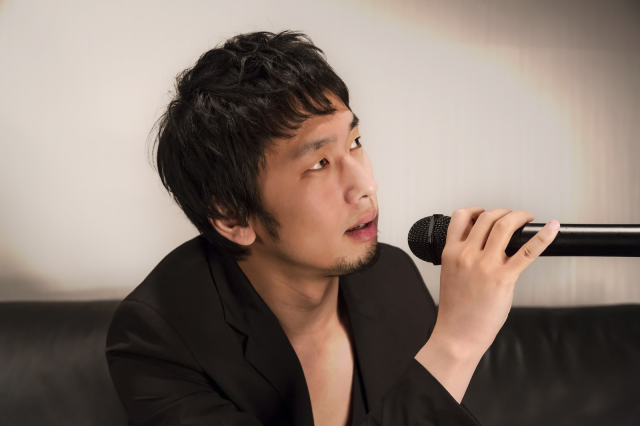
College student sets national karaoke quality record by tricking the machine with the sounds of his horn.
In addition to displaying lyrics and music videos, some karaoke machines will even grade your performance, awarding points for how closely you match the original pitch and rhythm of the song. However, getting a high score can be incredibly difficult if you don’t have a set of professional-level vocal chords.
So when Japanese Twitter user and Niigata University student @AoiIb_1108 stopped by a karaoke parlor with a friend, he was pretty impressed when his buddy finished his rendition of “Ito,” a popular ballad by singer Miyuki Nakajima, and the machine told him he’d performed it with a stunning 98.459-percent accuracy to Nakajima’s original, the highest score recorded by anyone in Japan on that particular karaoke network. Obviously, @AoiIb_1108’s friend must have a fantastic singing voice, right?
Actually, we don’t know, because he didn’t sing a single word during his record-breaking performance.
https://twitter.com/AoiIb_1108/status/1036178631641288704Instead, @AoiIb_1108’s friend brought his saxophone into the karaoke booth and replaced Nakajima’s vocals with notes from the soulful instrument. Even though he didn’t have any sheet music, the saxophonist was able to make do with the on-screen pitch guide, perfectly timing each breath with a substitute so convincing that the machine’s sensors and scoring mechanism counted them as acceptable vocals, almost like an instrumental method of singing scat.
One amazed commenter wondered if @AoiIb_1108’s friend is a professional musician, but he replied that no, his friend is still a freshman in their college’s music department. Amateur status aside, the video of his amazing karaoke feat has earned nearly four million views, and online praise such as:
“Going out to buy a saxophone.”
“This must be proof that Miyuki Nakajima was a saxophone in previous life.”
“What beautiful sounds. His saxophone playing is as full of emotion as a human voice.”
“I want to hear him play the full version.”
It’s kind of strange to think that karaoke machines apparently don’t require you to sing in order to win their respect. But then again, considering karaoke originally comes from the Japanese for “empty orchestra,” maybe their appreciation for fully instrumental music shouldn’t be such a surprise.
Source: Twitter/@AoiIb_1108 via Jin
Top image: Pakutaso
Follow Casey on Twitter, where Bump of Chicken’s “Tentai Kansoku” remains his go-to karaoke song.

 Three tips to be a better karaoke singer, from a professional singer-songwriter
Three tips to be a better karaoke singer, from a professional singer-songwriter How can you maximize the calories you burn singing karaoke?【Experiment】
How can you maximize the calories you burn singing karaoke?【Experiment】 Here’s what Japanese netizens think of the U.S.’s top 20 most-picked karaoke songs
Here’s what Japanese netizens think of the U.S.’s top 20 most-picked karaoke songs Over 500 karaoke boxes close due to Covid-19, dealing historic blow to the industry
Over 500 karaoke boxes close due to Covid-19, dealing historic blow to the industry How to improve your singing at karaoke with a deceivingly simple trick
How to improve your singing at karaoke with a deceivingly simple trick McDonald’s new Happy Meals offer up cute and practical Sanrio lifestyle goods
McDonald’s new Happy Meals offer up cute and practical Sanrio lifestyle goods Studio Ghibli glasses cases let anime characters keep an eye on your spectacles
Studio Ghibli glasses cases let anime characters keep an eye on your spectacles Super Nintendo World expansion gets delayed for several months at Universal Studios Japan
Super Nintendo World expansion gets delayed for several months at Universal Studios Japan Kyoto’s 100 Demons yokai monster parade returns!
Kyoto’s 100 Demons yokai monster parade returns! More foreign tourists than ever before in history visited Japan last month
More foreign tourists than ever before in history visited Japan last month The oldest tunnel in Japan is believed to be haunted, and strange things happen when we go there
The oldest tunnel in Japan is believed to be haunted, and strange things happen when we go there All-you-can-drink Starbucks and amazing views part of Tokyo’s new 170 meter-high sky lounge
All-you-can-drink Starbucks and amazing views part of Tokyo’s new 170 meter-high sky lounge Is the new Shinkansen Train Desk ticket worth it?
Is the new Shinkansen Train Desk ticket worth it? Beautiful Sailor Moon manhole cover coasters being given out for free by Tokyo tourist center
Beautiful Sailor Moon manhole cover coasters being given out for free by Tokyo tourist center We eat at three Japanese family restaurants to find the one with the best-value breakfast
We eat at three Japanese family restaurants to find the one with the best-value breakfast Disney princesses get official manga makeovers for Manga Princess Cafe opening in Tokyo
Disney princesses get official manga makeovers for Manga Princess Cafe opening in Tokyo Starbucks reopens at Shibuya Scramble Crossing with new look and design concept
Starbucks reopens at Shibuya Scramble Crossing with new look and design concept Beautiful new Final Fantasy T-shirt collection on the way from Uniqlo【Photos】
Beautiful new Final Fantasy T-shirt collection on the way from Uniqlo【Photos】 Foreign English teachers in Japan pick their favorite Japanese-language phrases【Survey】
Foreign English teachers in Japan pick their favorite Japanese-language phrases【Survey】 Japanese convenience store packs a whole bento into an onigiri rice ball
Japanese convenience store packs a whole bento into an onigiri rice ball We try out “Chan Ramen”, an underground type of ramen popular in the ramen community
We try out “Chan Ramen”, an underground type of ramen popular in the ramen community Studio Ghibli releases Kiki’s Delivery Service chocolate cake pouches in Japan
Studio Ghibli releases Kiki’s Delivery Service chocolate cake pouches in Japan Japan’s bone-breaking and record-breaking roller coaster is permanently shutting down
Japan’s bone-breaking and record-breaking roller coaster is permanently shutting down New definition of “Japanese whiskey” goes into effect to prevent fakes from fooling overseas buyers
New definition of “Japanese whiskey” goes into effect to prevent fakes from fooling overseas buyers Our Japanese reporter visits Costco in the U.S., finds super American and very Japanese things
Our Japanese reporter visits Costco in the U.S., finds super American and very Japanese things Studio Ghibli unveils Mother’s Day gift set that captures the love in My Neighbour Totoro
Studio Ghibli unveils Mother’s Day gift set that captures the love in My Neighbour Totoro Foreign passenger shoves conductor on one of the last full runs for Japan’s Thunderbird train
Foreign passenger shoves conductor on one of the last full runs for Japan’s Thunderbird train Domino’s Japan now sells…pizza ears?
Domino’s Japan now sells…pizza ears? New Japanese KitKat flavour stars Sanrio characters, including Hello Kitty
New Japanese KitKat flavour stars Sanrio characters, including Hello Kitty Kyoto creates new for-tourist buses to address overtourism with higher prices, faster rides
Kyoto creates new for-tourist buses to address overtourism with higher prices, faster rides Sales of Japan’s most convenient train ticket/shopping payment cards suspended indefinitely
Sales of Japan’s most convenient train ticket/shopping payment cards suspended indefinitely Sold-out Studio Ghibli desktop humidifiers are back so Totoro can help you through the dry season
Sold-out Studio Ghibli desktop humidifiers are back so Totoro can help you through the dry season Japanese government to make first change to romanization spelling rules since the 1950s
Japanese government to make first change to romanization spelling rules since the 1950s Ghibli founders Toshio Suzuki and Hayao Miyazaki contribute to Japanese whisky Totoro label design
Ghibli founders Toshio Suzuki and Hayao Miyazaki contribute to Japanese whisky Totoro label design Doraemon found buried at sea as scene from 1993 anime becomes real life【Photos】
Doraemon found buried at sea as scene from 1993 anime becomes real life【Photos】 Tokyo’s most famous Starbucks is closed
Tokyo’s most famous Starbucks is closed One Piece characters’ nationalities revealed, but fans have mixed opinions
One Piece characters’ nationalities revealed, but fans have mixed opinions We asked a Uniqlo employee what four things we should buy and their suggestions didn’t disappoint
We asked a Uniqlo employee what four things we should buy and their suggestions didn’t disappoint Princesses, fruits, and blacksmiths: Study reveals the 30 most unusual family names in Japan
Princesses, fruits, and blacksmiths: Study reveals the 30 most unusual family names in Japan Never get bored on a long flight again with Jetstar and Joysound’s Karaoke Flights!
Never get bored on a long flight again with Jetstar and Joysound’s Karaoke Flights! A private onsen bath with a karaoke machine is two of Japan’s best things with zero embarrassment
A private onsen bath with a karaoke machine is two of Japan’s best things with zero embarrassment Take your singing to new heights on the world’s first karaoke Ferris wheel in Tokyo
Take your singing to new heights on the world’s first karaoke Ferris wheel in Tokyo Godzilla speaks! Interview with 12-movie veteran kaiju actor Haruo Nakajima【Video】
Godzilla speaks! Interview with 12-movie veteran kaiju actor Haruo Nakajima【Video】 Skip Starbucks? A super-cheap, semi-secret alternative to a coffeehouse break in Tokyo
Skip Starbucks? A super-cheap, semi-secret alternative to a coffeehouse break in Tokyo Looking to have the best night out on Ishigaki Island in Okinawa? Go to this enka pub right now
Looking to have the best night out on Ishigaki Island in Okinawa? Go to this enka pub right now Luxury hotel chain offering karaoke in a large tub floating on the ocean
Luxury hotel chain offering karaoke in a large tub floating on the ocean Nintendo sends unto us Toad to utterly butcher a Christmas carol this holiday season 【Video】
Nintendo sends unto us Toad to utterly butcher a Christmas carol this holiday season 【Video】 Japanese karaoke chain offers discounts for couples who kiss in front of the employees
Japanese karaoke chain offers discounts for couples who kiss in front of the employees In a shocking twist, some idol singers really will go out with you if you buy their albums
In a shocking twist, some idol singers really will go out with you if you buy their albums This Do Re Mi Day, remember to give your child the gift of perfect pitch
This Do Re Mi Day, remember to give your child the gift of perfect pitch I need gum, milk, and a verse of “Let It Go”: Special karaoke convenience store to open
I need gum, milk, and a verse of “Let It Go”: Special karaoke convenience store to open The time P.K. flatly refused a request from his deceased best friend’s mom at their first meeting
The time P.K. flatly refused a request from his deceased best friend’s mom at their first meeting Love costumes and karaoke? Shinjuku Cosplay Karaoke is just what you need! 【Pics & video】
Love costumes and karaoke? Shinjuku Cosplay Karaoke is just what you need! 【Pics & video】 A singalong song from Japan to surpass “Paprika?” Presenting “Karaoke Neko-chan”【Video】
A singalong song from Japan to surpass “Paprika?” Presenting “Karaoke Neko-chan”【Video】 J-Pop singer to perform song written and composed by the emperor and empress at upcoming ceremony
J-Pop singer to perform song written and composed by the emperor and empress at upcoming ceremony
Leave a Reply